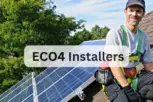ECO4 or GBIS? The Truth Behind Government Schemes

ECO4 vs GBIS: What is the Difference?
When it comes to improving the energy efficiency of homes across the UK, two government-backed schemes often come up: ECO4 and GBIS. Both are designed to help households cut bills, reduce carbon emissions, and make homes more comfortable—but they work in different ways. Understanding these differences is key for homeowners, landlords, and tenants who want to make the most of available funding opportunities.
What's in the article?
- ECO4 is a government scheme running until 2026 that funds a wide range of energy efficiency upgrades—insulation, heating systems, and renewable technologies—mainly for low-income households and homes with EPC ratings of D–G.
- GBIS (Great British Insulation Scheme) focuses solely on insulation measures and is open to a broader range of households, including many middle-income properties.
- Eligibility differs: ECO4 prioritises low-income and vulnerable households, while GBIS bases qualification more on EPC ratings than income.
- Scope of improvements: ECO4 can deliver full home transformations, while GBIS provides targeted insulation upgrades as a cost-effective starting point.
- Both schemes matter: ECO4 tackles fuel poverty in the least efficient homes, while GBIS helps millions more households cut bills and carbon emissions.
What is ECO4?
The Energy Company Obligation (ECO4) is the latest phase of a long-running government scheme that places responsibility on energy suppliers to fund energy efficiency improvements in UK homes. Running until March 2026, ECO4 is aimed primarily at low-income households and those living in properties with poor energy performance certificates (EPC ratings of D, E, F, or G).
Through ECO4, eligible households can access a wide range of measures to make their homes more efficient. This includes various forms of insulation such as cavity wall, loft, underfloor, room-in-roof, and both internal and external wall insulation. It also covers heating improvements like first-time central heating systems, heating controls, and modern storage heaters. On top of this, ECO4 supports renewable technologies, with solar PV panels and air source heat pumps available to qualifying households.
The core aim of ECO4 is not just to reduce household energy costs, but also to bring the UK housing stock in line with net-zero carbon targets by improving the least energy-efficient properties.
What is GBIS?
The Great British Insulation Scheme (GBIS), formerly known as ECO+ or ECO Plus, is a newer initiative launched alongside ECO4. Unlike ECO4, GBIS has a much narrower focus. Its purpose is to deliver insulation measures to homes with low EPC ratings, and it is designed to reach a broader audience. Whereas ECO4 is primarily targeted at low-income households, GBIS opens the door to middle-income households who wouldn’t usually qualify for ECO4 support.
GBIS provides funding for insulation measures such as loft insulation, cavity wall insulation, and solid wall insulation—either internal or external. By focusing exclusively on insulation, GBIS helps households cut energy bills quickly and effectively, since insulation is often the most cost-efficient way to retain heat and improve energy efficiency in a property.
– Covers a wide range of measures, including insulation, heating upgrades, and renewable technologies.
– Can deliver a full property transformation, significantly improving EPC ratings.
– Targets the most vulnerable households, helping tackle fuel poverty.
– Provides long-term solutions with lasting energy efficiency improvements.
– Eligibility is stricter, often requiring households to receive certain benefits or have EPC ratings of D–G.
– Application process may feel more complex due to multiple qualification routes.
– Primarily focused on low-income homes, so middle-income households may miss out.
– Focuses on insulation improvements, one of the quickest and most cost-effective ways to cut bills.
– Easier eligibility pathway, based mainly on EPC ratings.
– Provides a straightforward entry point for households not eligible for ECO4.
– Scope is limited to insulation only—no heating systems or renewable technologies.
– Delivers smaller improvements compared to ECO4, often a starting point rather than a full upgrade.
– May not achieve as large an EPC boost as ECO4 can.
Which Scheme is Right for You?
If your home struggles with low EPC ratings and your household meets income or benefits-based criteria, ECO4 may be the better fit. It offers a wide range of solutions, from solar panels to first-time heating systems, and can completely reshape your home’s efficiency profile.
On the other hand, if you don’t meet the strict ECO4 criteria but still live in an inefficient property, GBIS provides a straightforward way to access free or heavily subsidised insulation. Even a single insulation measure can reduce energy bills significantly and make your home warmer.
Final Thoughts
Both ECO4 and GBIS play a vital role in helping the UK move towards a greener, more energy-efficient future. While ECO4 offers deep, comprehensive improvements for vulnerable households, GBIS opens the door for millions more people to benefit from insulation upgrades.
Whether you’re a landlord ensuring your rental property meets EPC requirements, a homeowner looking to cut costs, or a tenant living in a draughty house, it’s worth exploring both schemes to see which applies to you. With government-backed funding available, there’s no reason to delay making your home more efficient, comfortable, and future-proof.





